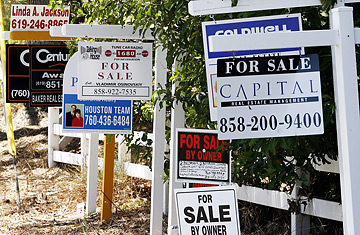
Houses for sale in Southern California
The wildfires were San Diego's second big catastrophe this year. The first was the collapsing real estate market and the attendant slowdown in the local jobs market. Will the fires worsen the property situation? Or will it be the impetus for the revival of the local economy?
"Obviously," says realtor Della June, 34, "the fire is definitely not good for our economy right now." The market has an excess inventory of homes and the owners of those properties that have been burned or damaged are in an even deeper hole. However, that same sector will also see an immediate benefit. About 1,700 families lost their houses and will need somewhere to live, at least temporarily. Jason Austell, 41, another realtor, says that some of those families, if they have the right policies, will even see their rents for temporary housing subsidized by their insurance companies. "What you'll see is a more competitive rental market," says Austell. There are about 19,000 condominiums and single-family homes on the market right now. Austell believes they will attract more potential customers, not just prospective renters but potential buyers as well. Says Alan Gin, an economist at the University of San Diego: "The people who are displaced will have to go back into the market. The rental market will surge because many of the displaced will rent apartments and homes. Some people whose homes couldn't sell in this market or find renters for their homes will now find new potential."
Whether these immediate benefits start some sort of momentum toward recovery depends on the nature of San Diego's slump. In November 2003, what is called the Cedar fire burned 250,000 acres in San Diego county and destroyed 2,500 homes. After that disaster, the real estate market continued to rise after a temporary setback, hitting a peak in 2005. "The market took a hit," says Austell of 2003, "but it immediately bounced back." But June points out that the Cedar fires took place at a time when the local economy was in an upswing. "It's hard to tell what will happen because of the real estate cycle we're currently in," she says.
This time around, different factors are at play. Job growth in San Diego slowed dramatically from July 2006 to July 2007. Only 1,600 new jobs were created in that time compared to the previous 12-month period, which saw 18,000 new positions open. The resulting dampening of earnings added to the slumping real estate market, which is off at least 25% from last year.
Have the fires changed that calculus? The evaporation of new jobs this year is at least partly the result of the slowdown in new construction. However, with fresh building likely to increase after the fire, many of those construction and construction-related jobs may return, along with a revival of spending power. Several experts say that San Diego remains a destination market and will continue to attract new home buyers. And, after the fires, says June, "in the grander scheme of things, it's likely that people who rebuild will build nicer homes."
But "grander schemes" are also why economic recovery may be more protracted. "San Diego is a desirable place to live in terms of the quality of life," says Gin, the economist. "The only problem is the high housing cost compared to what people make. If you compare income to average cost of a home, San Diego is the second worst in the state, right after San Francisco." Indeed, home prices have tripled since 1997. And if a new burst of home-building is accompanied by another rise in prices, the market may have trouble sustaining any kind of recovery, particularly with lenders stung by the subprime loan crisis. "This is just one event," says Gin, referring to this week's fires. "It's big, but it's dominated by the bigger problem like the subprime mortgages and increased foreclosures. It's the bigger picture right now that is more important." A real comeback for housing, he predicts, will not happen until interest cut come down: "It will be 2009 before we see a rebound in this housing market."
